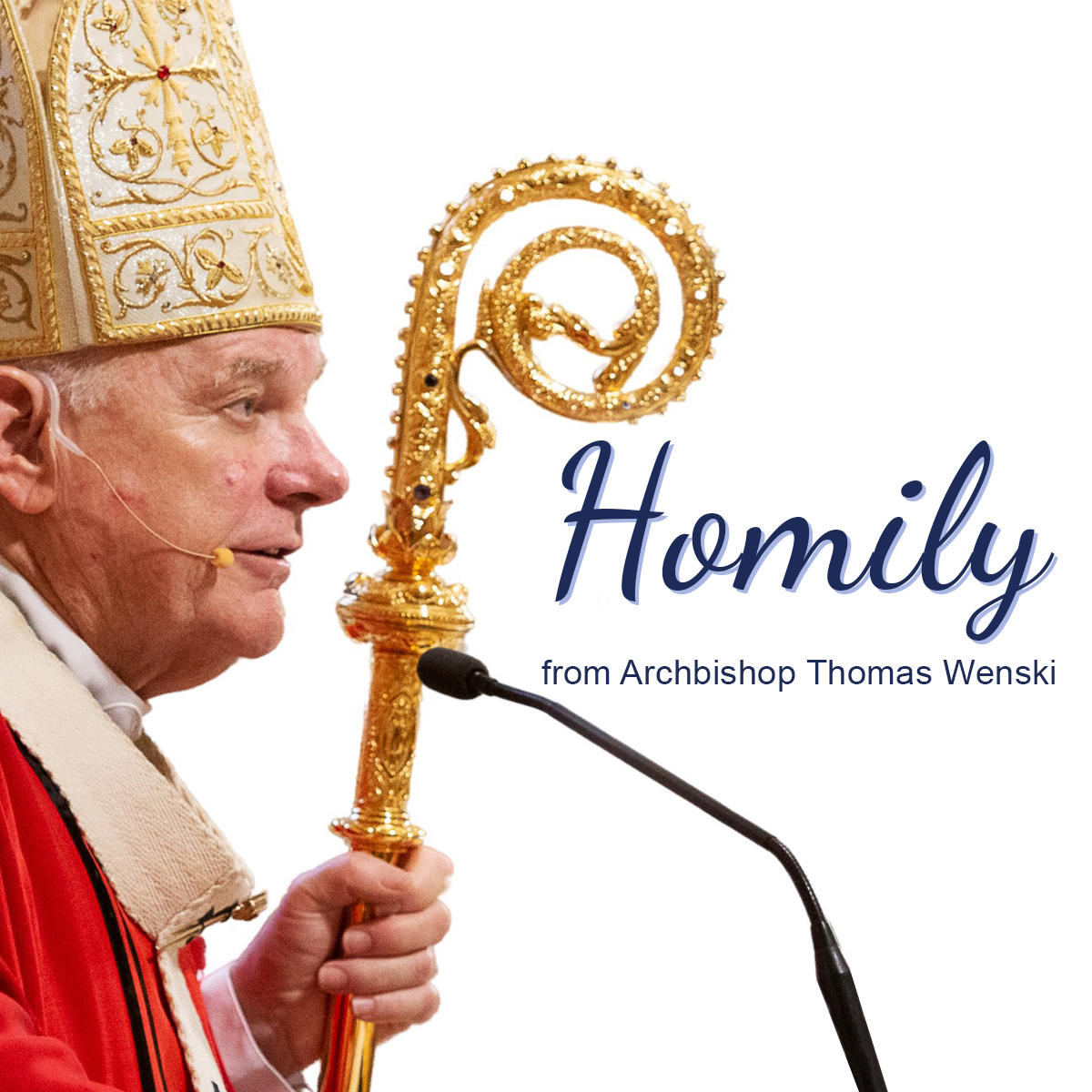By Archbishop Thomas Wenski - The Archdiocese of Miami
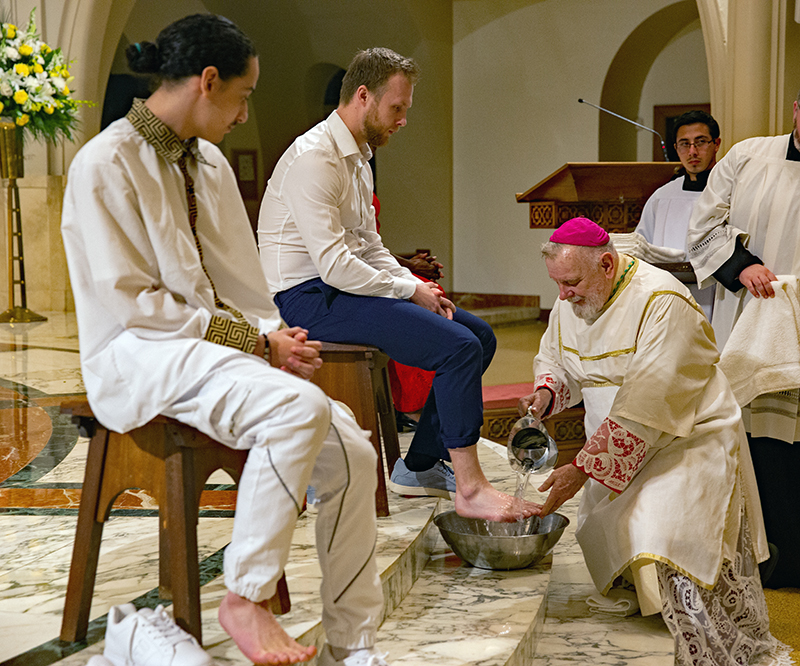
Photographer: MARLENE QUARONI | FC
Archbishop Thomas Wenski washes the feet of catechumen Maxime Ramioulle as Theodore Earley looks on, during Holy Thursday Mass at St. Mary Cathedral, March 28, 2024.
Archbishop Thomas Wenski preached this homily during the Mass of the Last Supper on Holy Thursday, March 28, 2024, at St. Mary Cathedral
We have begun the Triduum � three holy days in which we commemorate that Jesus’ hour has come. “Having loved his own who were in the world, he loved them to the end.” These words are the key to our understanding what Jesus does tonight at this Last Supper. These words are the key to our understanding of the Paschal Mystery that we commemorate in these next few days.
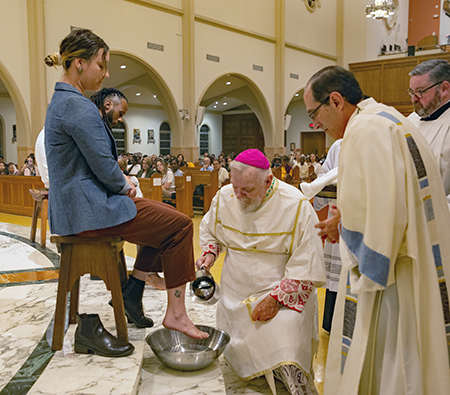
Photographer: MARLENE QUARONI | FC
Archbishop Thomas Wenski washes the feet of catechumen Niko Test during Holy Thursday Mass at St. Mary Cathedral, March 28, 2024.
In Jesus Christ, God became a man � like us. He became like us so that we might become like him. Jesus became a man like us to die like us � so that we would not have to die forever. In these days, we remember the passion, death and Resurrection of our Lord; that is to say, we remember his Exodus, his Passover from death to life � and in him, with him and through him, we too Passover through the waters of baptism from death to life; with Christ we make our exodus from the slavery of sin to the freedom of the Children of God so that we might no longer live for ourselves but for him who died and rose again for us.
En esta noche, Dios se nos entrega. Contemplamos a Dios a rodillas, contemplamos a Dios escondido tras las apariencias del pan y del vino. Jesús establece una Nueva Alianza con un nuevo Mandamiento, un nuevo sacrificio con un nuevo sacerdocio.
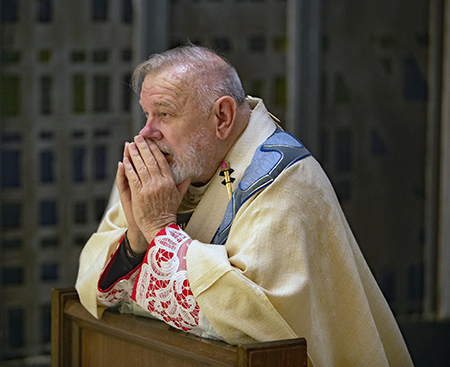
Photographer: MARLENE QUARONI | FC
Archbishop Thomas Wenski prays before the Blessed Sacrament at the conclusion of the Mass of the Lord's Supper he celebrated on Holy Thursday, March 28, 2024, at St. Mary Cathedral, Miami.
Tonight is about God’s gift of himself to us in his Son, Jesus Christ. Tonight, we contemplate God in an apron, God on his knees, God hidden under the appearances of bread and wine. As Jesus ate the Passover with his disciples, he establishes a New Covenant with a New Commandment, a New Sacrifice with a New Priesthood.
Fr� ak s� m yo, d�nye moman Jezi pase av� n anvan yo touye l la, chaje ak gwo koze, ak b�l j�s, li chaj� ak m�v�y. L� sa a li mete tou sa ki nan k� l dey� pou l montre n jouk ki pwen li renmen n. L� sa a, li fete F�t Pak Ansyen Kontra a yon deny� fwa ak zanmi l yo. An menm tan, li f� n antre nan yon Nouvo Konra a li ta pral siyen a pw�p san li pou nou f� youn av� l. Se l� sa a tou, li lave pye zanmi l yo, pou l montre ki jan youn dwe renmen l�t, pou l montre ki jan youn dwe s�vi l�t. Konsa, jodi a, Jezi mete yon Nouvo Kontra ak yon Nouvo K�mandman; li mete yon nouvo sakrifis, ak yon nouvo sas�dos.
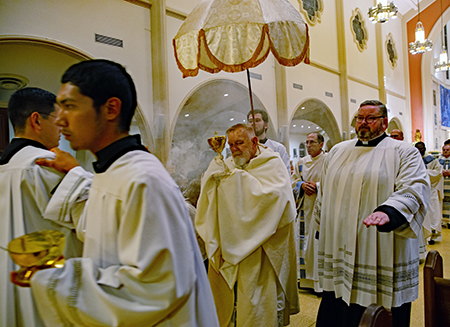
Photographer: MARLENE QUARONI | FC
Archbishop Thomas Wenski carries the consecrated host in procession through St. Mary Cathedral at the conclusion of the Mass of the Lord's Supper on Holy Thursday, march 28, 2024.
“I give you a new commandment, the Lord says, love one another as I have loved you.” The gesture of washing the feet of his apostles speaks for itself. In this gesture we learn how we can put the Eucharist � our communion in the Body and Blood of Jesus � into practice in our lives. Service is the vocation of every Christian � and we only realize ourselves as persons through the sincere gift of ourselves. Service, self-giving, not self-seeking or self-assertion is what gives meaning in our lives.
Moun yo m�t di, “rann s�vis bay chagren”, men, Jezi di n, “rann s�vis bay lavi, lavi n�t ale a. S�vi fr� n ak s� n yo menm jan Jezi te konn s�vi nou se fason pou n viv Lekaristi a. Nan Jezi, nou w� Bondye a jenou, nou w� Bondye k ap lave pye nou. Epi, li di nou, ‘Se yon egzamp mwen ban nou, pou nou kab f�, menm jan mwen te f� pou nou an.
Photographer: MARLENE QUARONI | FC Churchgoers pray before the Blessed Sacrament with the Last Supper depiction displayed above the altar, at the conclusion of Holy Thursday Mass at St. Mary Cathedral, March 28, 2024.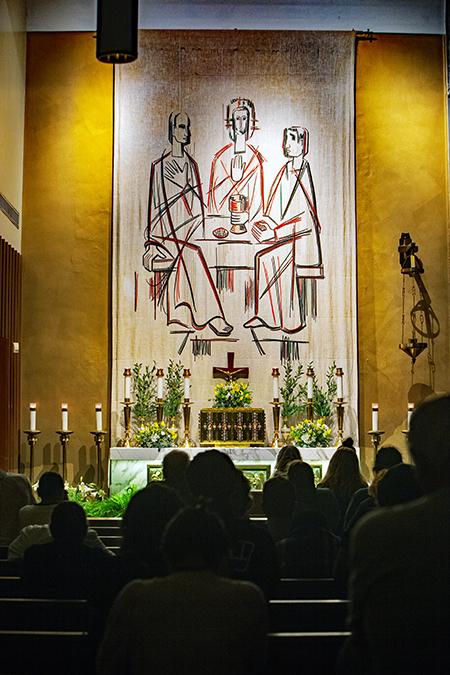
La hora de Jesús ya ha llegado � fue por eso que él vino: se hizo hombre para morir para que nosotros no tuviéramos que morir por siempre. Se hizo un hombre como nosotros, se nos pareció en todo menos en el pecado para que pudiéramos parecernos a él. En estos tres días que comienzan hoy con la cena del Señor recordamos su éxodo � o sea, su paso de la muerte hacia la vida. Con Cristo, hagamos nuestro propio éxodo, para que ya no vivamos por nosotros mismos sino por el que murió y resucito por nosotros.
As we move with Jesus from the Upper Room to the Garden of Gethsemane, as we walk with him along the Way of Cross, as we stand beneath his Cross and keep vigil at his tomb, may his words echo in our hearts: “as I have done for you, you should also do.”
“Habiendo amado a los suyos, los am� hasta el extremo.”
"Li te deja renmen moun pa l yo, ki te sou t� a, li renmen yo jis nan d�nye bout.”
“Having loved his own who were in the world, he loved them to the end.”
